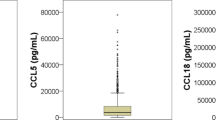Abstract
Inflammation is associated with atherosclerosis of coronary arteries. Chemokines have an important role in inflammation. The CCR2 chemokine receptor mediates leukocyte chemoattraction, which is involved in the pathogenesis of coronary heart disease. We prospectively studied 1960 consecutive patients aged under 65 years and referred for a first-time left ventricular catheter. Left heart catheters were analyzed by two independent cardiologists for the presence of myocardial infarction (regional wall motion abnormality) and moderate or severely reduced left ventricular function on cineventriculography and presence of coronary atherosclerosis on angiography. Genotyping for CCR2 V64I polymorphism was performed. The presence of the rare allele of the CCR2 gene was significantly associated with a higher prevalence of myocardial infarction on cinventriculography (32.0% vs. 24.2%, moderately or severely reduced left ventricular function (14.0% vs. 9.5%) and NYHA class III or IV (16.7% vs. 12.2%). The association of the CCR2 genotype with heart failure was not independent of the presence of myocardial infarction in multivariate analysis. There was no association of the CCR2 genotype with coronary atherosclerosis. The CCR2 genotype seems to predispose patients for myocardial infarction before the age of 65 years. The higher prevalence of heart failure in gene carriers with the rare alle might be a consequence of myocardial infarction. If the CCR2 genotype is associated with higher mortality in the general population must be investigated in further studies.

Similar content being viewed by others
References
Ross R (1986) The pathogenesis of atherosclerosis-an update. N Engl J Med 314:488–500
Rollins BJ (1997) Chemokines. Blood 90:909–928
Weber C (2003) Novel mechanistic concepts for the control of leukocyte transmigration: specialization of integrins, chemokines, and junctional molecules. J Mol Med 81:4–19
Boring L, Gosling J, Cleary M, et al (1998) Decreased lesion formation in CCR2−/− mice reveals a role for chemokines in the initiation of atherosclerosis. Nature 394:894–897
Smith MW, Dean M, Carrington M, et al (1997) Contrasting genetic influence of CCR2 and CCR5 variants on HIV-1 infection and disease progression. Hemophilia Growth and Development Study (HGDS), Multicenter AIDS Cohort Study (MACS), Multicenter Hemophilia Cohort Study (MHCS), San Francisco City Cohort (SFCC), ALIVE Study. Science 277:959–965
Van Rij RP, de Roda Husman AM, Brouwer M et al (1998) Role of CCR2 genotype in clinical course of syncitium-inducing (SI) or non-SI numan immunodeficiency virus type 1 infection and in the time to conversion to SI virus variants. J Infect Dis 178:1806–1811
Gonzales P, Alvarez R, Batalla A, et al (2001) Genetic variation at the chemokine receptors CCR5/CCR2 in myocardial infarction. Genes Immun 2:191–195
Anonymous (1999) Freely associating. Nat Genet 22:1–2
Marenberg ME, Risch N, Berkman LF, et al (1994) Genetic susceptibility to death from coronary heart disease in a study of twins. N Engl J Med 330:1041–1046
Livak KJ (1999) Allelic discrimination using fluorogenic probes and the 5' nuclease assay. Genet Anal 14:143–149
Valdes AM, Wolfe ML, O'Brien EJ, Spurr NK, Gefter W, Rut A, Groot PH, Rader DJ (2002) Val64Ile polymorphism in the C-C chemokine receptor 2 is associated with reduced coronary calcification. Arterioscler Thromb Vasc Biol 22:1924–1928
Acknowledgements
The study was supported by a grant of the BIOMAT and START program of the University Hospital of Aachen. J.R.O. designed the study, performed the statistical analysis, and wrote the manuscript, J.R.O., V.M., F.S., K.V., and K.Z. coordinated and carried out data collection and performed genotyping, C.W. helped with data interpretation and manuscript writing, U.J., A.F., P., and R.H. coordinated the study and approved phenotyping.
Author information
Authors and Affiliations
Corresponding author
Rights and permissions
About this article
Cite this article
Ortlepp, J.R., Vesper, K., Mevissen, V. et al. Chemokine receptor (CCR2) genotype is associated with myocardial infarction and heart failure in patients under 65 years of age. J Mol Med 81, 363–367 (2003). https://doi.org/10.1007/s00109-003-0435-x
Received:
Accepted:
Published:
Issue Date:
DOI: https://doi.org/10.1007/s00109-003-0435-x




